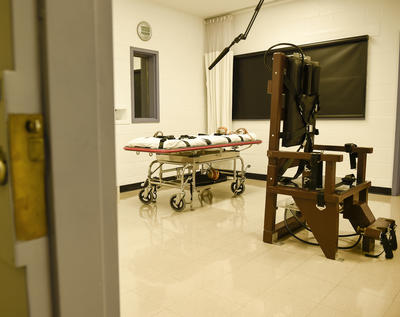
A West Tennessee man was put death Thursday night at Riverbend Maximum Security Institution in Nashville.
Donnie Johnson received lethal injection for the 1984 slaying of his wife, Connie. Supporters had emphasized Johnson’s religious awakening while behind bars, and his final moments reflected a spiritual theme.
Johnson sang hymns as he entered the execution chamber, and again for more than two minutes as the execution drugs began to take effect. His final statement also included a prayer asking forgiveness — for himself and his executioners — and an acknowledgement of his wrongdoings.
“He was tired, but at peace,” said Kelley Henry, a federal public defender and Johnson’s attorney. “The singing didn’t surprise me. Don really enjoyed singing spiritual hymns, so to me, that was for him, comfort.”
The family of Connie Johnson did not speak to the media afterward, but a spokeswoman for the Tennessee Department of Corrections read a statement from her sister Margaret Davis. It said that Johnson’s execution was just, and it lamented that it took more than three decades for his sentence to be carried out:
“This is a great indication as to why our criminal justice system needs to be reevaluated. Connie’s death was inhumane and indescribable. Connie’s life was never given a 34-year extension. Instead, she was brutally murdered. Our family has endured this pain and has carried this burden for most of our lives.”
Johnson has not contested that he killed his wife about two weeks before Christmas in 1984. He
suffocated her with a 30-gallon garbage bag, stuffing it down her throat until she died.
Execution By Lethal Injection
Johnson is the only second person to be put to death by lethal injection since 2009. Tennessee’s death penalty was put on hold for nearly a decade because the state couldn’t get the drugs needed to carry out the sentence. It restarted in the fall, but two of the three men executed since then have opted instead for the electric chair.
Johnson received a three-drug cocktail of midazolam, vecuronium bromide and potassium chloride. It took about 20 minutes to complete, in line with the state’s lethal injection protocols.
The execution began shortly before 7:18 p.m. Central Daylight Time. When the curtain rose on the execution chamber, Johnson was already heavily restrained, with an IV tube inserted into his arm in the hollow of the elbow.
Johnson was given the opportunity to make a final statement. He delivered a lengthy prayer that was at times difficult to understand — the effect of two strokes suffered while behind bars, his attorney said.
It included references to Jesus’ prayer on the cross and a statement of repentance. Johnson gave thanks to God and indicating that he accepted his fate.
“I commend my life into your hands,” he concluded. “Thy will be done. In Jesus’ name I pray, Amen.”
The warden then gave the signal for the first drug to be administered. Johnson asked permission to sing as the sedative took effect. He sang two verses of “They’ll Know We Are Christians,” followed by two verses and part of the third of “Soon and Very Soon,” a hymn about death.
After a little more than two minutes, Johnson’s voice trailed off and he began to gurgle rhythmically. At 7:25, the warden performed a consciousness check. Then the second drug was administered. Johnson issued a sharp, bark-like noise twice then fell silent.
His color began to pale then turn purple. He did not appear make any motion with his extremities during the execution, but his lawyer says that because he was tightly bound and the view of his body partially obstructed by prison personnel, it would have been difficult to see any signs of suffering.
“That is a very significant issue for us,” Henry said, “in terms of the ability of the individuals administering the protocol to know whether or not the individual is in fact insensate.”
Johnson was pronounced dead at 7:37 p.m.
More Executions Scheduled
As a member of death row, Johnson was part of a class-action lawsuit filed last year contesting the secrecy around Tennessee’s lethal injection protocol. Attorneys for the inmates say it is unfair that the state will not tell them the source of the drugs — especially since pharmaceutical manufacturers began refusing to supply them for executions about a decade ago.
But earlier this week, the U.S. Supreme Court declined to hear their case, clearing the final legal hurdle to the execution.
Johnson himself did not file any last-minute legal appeals to try to delay or cancel his execution. Instead, his supporters relied on his apparent religious fate. Johnson adopted Seventh-Day Adventism and became an ordained elder — the only such person in the denomination to hold that title while in prison.
Gov. Bill Lee rejected that application for clemency, saying that “after a prayerful and deliberative consideration” he’d decided to uphold the sentence.
Three other men are scheduled to be executed this year, as well as three more in early 2020.


